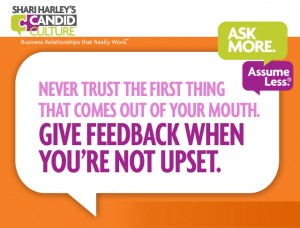Posts Tagged ‘constructive feedback’
The normal, human response to negative feedback is to become defensive. Becoming defensive is a survival instinct, like hitting your breaks when the car in front of you stops short. It’s almost unavoidable.
The challenge with becoming defensive is that the person who risked telling you the truth (as she sees it) doesn’t want to deal with your defensiveness. Your defensiveness is . . . scary, intimidating, annoying – fill in the blank.
So what’s the right answer?
Here’s my recommendation on how to respond to negative feedback:
When someone gives you feedback, listen. Listening doesn’t mean you do what the other person wants. Listening merely means take in the message. Hear what the other person has to say. And ask questions for greater understanding, if you can do so without being defensive. In my experience, asking questions, in the moment, without being defensive is VERY hard to do.
I got critiqued for admitting, in last week’s blog, that I broke one of my own rules by sending feedback via email. I study, teach and write about how to communicate well. And I’m human. Sometimes my emotions get the best of me. But when they do, I clean it up fast.
The last time I got feedback from a friend I got defensive. And during the conversation, right after I became defensive, I caught myself, apologized, and asked the person to tell me again. I said, “I’m sorry I got defensive. Tell me again and I’ll do a better job of listening.”
You won’t always communicate perfectly. It’s not possible. The key is to catch yourself quickly and clean up the messes you make. If you raise your voice, apologize. If you cry, remove yourself from the situation until you can speak calmly. If you push back and defend versus listen, own your behavior and do a better job of listening. You’ll earn respect by admitting when you fall short.
It’s easy to mistake listening to feedback and saying “Thank you for telling me that” as agreement. I’m not suggesting you agree or give in. When you’re calm and can interpret the feedback, without emotion, go back to the person to talk more. It’s ok to push back. It’s ok to say you disagree or that she is mistaken. But if you have this conversation when you receive the feedback, the other person will likely be so daunted by your reaction that she is not likely to give you feedback again, and that’s a loss for you.
So few people will risk being honest with you, make it easy on those who do.
A few weeks ago one of my friends asked for feedback on how he communicated. When I told him what I thought he responded with, “So, you’re telling me I did it all wrong.” Aka, he got defensive, so I back peddled. In that moment my brain got trained, this guy can’t take feedback. So the next time he asks me, I won’t give any.
It doesn’t take much to train people not to tell you the truth. One instance of defensiveness will do it. Don’t do that to yourself. You need the data. You don’t need to agree with what the person says or change your behavior, but you need to know what people think and say about your performance.
Let’s review how to respond to negative feedback:
- Ask for feedback.
- Listen.
- Don’t defend.
- Think about what the person said.
- Wait until you’re calm.
- When you can ask questions and discuss without being defensive, talk further.
Now that you know how to respond to negative feedback, use our Advancing Career Questions to get more feedback:

 We’ve all received work from another person that wasn’t what we were expecting, hit reply, and told the other person what we thought. Then we dealt with the consequences.
We’ve all received work from another person that wasn’t what we were expecting, hit reply, and told the other person what we thought. Then we dealt with the consequences.
A few tips for giving feedback to get more of what you want and less of what you don’t:
Don’t give feedback via email. Ever. You can’t manage your tone or see the person’s reaction.
Practice the 24-hour rule and the one week guideline. Wait until you’re not upset to give feedback, but don’t wait longer than a week.
It’s almost impossible to give feedback without putting the other person on the defensive. Becoming defensive when receiving feedback is normal and natural. It’s a way to protect ourselves when we feel attacked.
When people are defensive, it’s hard to listen and respond. The less defensive the other person becomes, the easier it is to communicate with that person. People will be less defensive if you give feedback when you’re calm and choose your words carefully.
Communicate in a way that the relationship needs versus what you need in the moment.
When we give feedback when we’re upset, we’re really communicating for us, not for the other person. I didn’t get what I want. I’m upset. And I’m going to tell you about it. Then the other person gets upset and now, in addition to you not getting what you wanted in the first place, you have to do damage control.
Communicating in a way the relationship needs means choosing the timing, words and method of communication that is likely to produce the result you want – the other person being able to hear you, while becoming minimally defensive, and taking action. Giving feedback when you’re upset, especially via email, will not produce the result you want. You’ll only damage your relationship.
Being a good communicator and maintaining good business relationships requires patience and self discipline. This is something I work on ALL the time. Last week I sent one of my vendors feedback via email, when I was upset, and spent two days trying to recover. I sent a minor email with critique, he felt attacked, and I damaged our relationship.
It doesn’t take much to raise someone’s defensiveness to the point that you have to do damage control.
Wait to give feedback until you’re not upset. Don’t send an email. Pick up the phone or walk to the person’s desk. Deliver the feedback in a way the other person can hear you. Be ready for him to become defensive. It’s human to become defensive. You can’t eliminate defensiveness, but how you deliver feedback can greatly reduce it. And you’ll get more of what you want and less of what you don’t.
Read How to Say Anything to Anyone and get the words to have even the toughest conversations.

 Wearing too much perfume or cologne will make people scatter, or wish they could. Unfortunately, rather than tell you that you’re wearing too much, people will just avoid sitting near you. Scent is such a personal thing, like clothing, that people are hesitant to comment on it.
Wearing too much perfume or cologne will make people scatter, or wish they could. Unfortunately, rather than tell you that you’re wearing too much, people will just avoid sitting near you. Scent is such a personal thing, like clothing, that people are hesitant to comment on it.
I suggest not wearing anything scented at work, on airplanes, or when you’ll be in close proximity with other people you don’t know well. But if I can’t persuade you to skip the scent, here are a few guidelines when putting on cologne and perfume:
• Spray the air ten inches in front of you, and walk through the mist, rather than spraying your skin.
• If you can smell the scent on yourself or people who are more than a few inches from you can smell it, you’re wearing too much.
• You should never be able to smell a person’s cologne after they’ve left a room.
No, I’m not an expert on how to wear perfume. I googled it.
The next step is to ask a few people you trust to tell you when you wear too much perfume or cologne. Give people permission to give you this feedback, and promise you won’t bite their head off when they do. This could sound something like, “I want to be sure I’m not wearing too much perfume. Would you be willing to tell me when I do? I promise I won’t freak out or jump down your throat. I really want to know.”
Let’s say you work with someone who wears too much perfume. She hasn’t asked if she’s wearing too much, and you want to say something. You could say something like, “This is a bit awkward, but the perfume you wear is a bit overwhelming. Would you be willing to wear less or none at all when you’re in the office?” This is an awkward conversation that most people don’t want to have. Consider that you’re doing the person a favor. Would you rather know the amount of scent you wear keeps other people away, or would you rather alienate the people around you?
If the relationship is a personal one, you could say, “You wear the most lovely perfume. And I’ve noticed that the smell is quite strong. Would you be willing to wear less of it?” Again, this is an awkward conversation. But you won’t die from having it and the other person won’t either. When she gets over being embarrassed and defensive, your relationship will be fine. And if it’s not, you didn’t have much of a relationship to begin with.

Use our Candor Questions to Advance Careers to find out what people say about you when you’re not there.
 Many organizations spend more money than they have to on employee recognition gifts and appreciation programs that often involve bonuses, paid time off, contests, gifts, and other expensive forms of compensation. What employees want most is to know they’re doing a good job.
Many organizations spend more money than they have to on employee recognition gifts and appreciation programs that often involve bonuses, paid time off, contests, gifts, and other expensive forms of compensation. What employees want most is to know they’re doing a good job.
Giving feedback in the workplace is the cheapest, most effective, and often overlooked form of employee recognition. Employees want to know how they’re performing, and most employees get little to no positive or constructive feedback at work. They may not want to hear negative feedback, but employees want to know if they aren’t meeting expectations.
In one of Candid Culture’s training programs, I give participants a box of questions to help coworkers set expectations and improve workplace communication. Some of the questions include:
- Do you prefer to receive information via email, voicemail, or text message?
- Are you a big picture or a detail person?
- What are your pet peeves at work?
- What type of work do you like to do most? What type of work do you like to do least?
- What do you wish I would start, stop, and continue doing?
I am consistently amazed at how often training participants ask what their coworkers wish they would start, stop and continue doing. I assume employees will be hesitant to ask for constructive feedback in front of a group of peers. But training participants consistently tell me that they get almost no positive or constructive feedback at work, and they’re desperate for the information.
Here’s How to Celebrate Valentine’s Day at Work Without Spending Money:
- Give clear, specific, and timely positive and negative feedback. Employees want to know how they’re performing.
- Ask what type of work employees really want to do, and let them do that work most of the time.
- Ask what skills employees want to learn, and give them a chance to attain those skills.
- Write hand written notes of appreciation.
Employees at Candid Culture get their birthdays off paid. We often buy employees lunch, give bonuses, and have a generous time off policy. Those perks are important and do help retain employees. But monetary rewards never replace or supersede the value of being aware of employees’ performance and caring enough to tell employees the truth.



 We’ve all received work from another person that wasn’t what we were expecting, hit reply, and told the other person what we thought. Then we dealt with the consequences.
We’ve all received work from another person that wasn’t what we were expecting, hit reply, and told the other person what we thought. Then we dealt with the consequences.
 Wearing too much perfume or cologne will make people scatter, or wish they could. Unfortunately, rather than tell you that you’re wearing too much, people will just avoid sitting near you. Scent is such a personal thing, like clothing, that people are hesitant to comment on it.
Wearing too much perfume or cologne will make people scatter, or wish they could. Unfortunately, rather than tell you that you’re wearing too much, people will just avoid sitting near you. Scent is such a personal thing, like clothing, that people are hesitant to comment on it.

